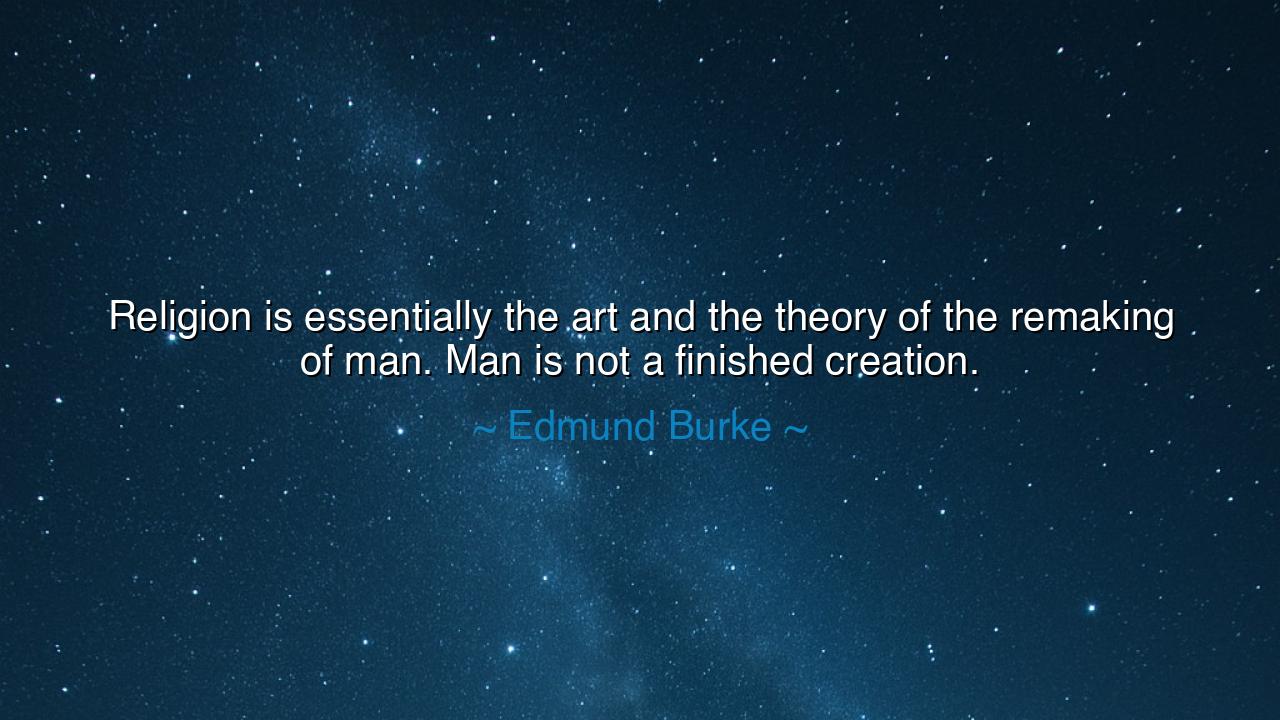
Religion is essentially the art and the theory of the remaking of
Religion is essentially the art and the theory of the remaking of man. Man is not a finished creation.






“Religion is essentially the art and the theory of the remaking of man. Man is not a finished creation.” Thus spoke Edmund Burke, the philosopher and statesman of profound moral vision, whose words cut to the very heart of what it means to be human. In this declaration, Burke does not speak of religion merely as ritual or dogma, but as a living force, a sacred craft through which humanity continually shapes and refines itself. He reminds us that man is not static — he is unfinished, ever in the process of becoming, sculpted by faith, struggle, and the pursuit of higher truth.
Burke lived in an age of upheaval — the Enlightenment and the revolutions that followed — when the world was tearing away from its old beliefs in pursuit of reason alone. Yet he, wise beyond his time, saw that reason without spirit leads not to progress, but to emptiness. For man, he argued, is not a machine perfected by science, but a soul awakened by purpose. Thus, he declared that religion — not as superstition, but as a moral compass — is the art of human renewal, the sacred flame that molds the rough clay of our nature into something noble and enduring.
In calling religion “the art and theory of the remaking of man,” Burke gives us an image of faith as both artist and architect. Art refines what already exists; theory guides what might yet be built. Religion, in its truest form, does both — it awakens the heart to goodness and guides the mind toward wisdom. It does not simply tell us what to believe; it calls us to transform. For every human being is born incomplete, flawed and seeking. We are like stones waiting for the sculptor’s hand, and religion — when pure — is the chisel that shapes us toward virtue, humility, and love.
History offers countless examples of this transformative power. Consider Saint Francis of Assisi, a man born to wealth and privilege, who abandoned all comfort to live in harmony with the poor and the forgotten. Through faith, he remade himself from a youth of vanity into a living embodiment of compassion. His religion was not a creed of words, but of action — a daily remaking of the self in service to others. Through him, the divine became visible in simplicity, and the world saw that the remaking of man begins not with power, but with surrender.
Burke’s words also carry a warning: if religion is the art of remaking, then to abandon it is to leave man unshaped. Without moral discipline, without reverence for something higher than the self, humanity drifts toward chaos. The same energy that can build temples can also destroy them. The French Revolution, which Burke witnessed with horror, was for him the proof of this truth — men who sought freedom but rejected spiritual order unleashed violence instead of virtue. To be unfinished is not shameful; but to refuse the work of finishing — to reject the moral and spiritual shaping that makes one truly human — is to remain forever crude, like marble left uncarved.
Yet Burke’s vision of religion is not narrow or confined to any one creed. He speaks of religion as essence, not institution — as the spirit within humanity that yearns to rise above instinct and ignorance. Every act of conscience, every search for meaning, every attempt to live justly is a form of worship. Whether one kneels in a cathedral or gazes at the stars in silent awe, the same current flows: the desire to become more than we are. Religion, then, is not a cage that binds us to rules, but a fire that purifies, that burns away the lesser self until the divine within begins to shine.
So, my child, remember this teaching well: you are not yet finished. You were not born perfect, nor are you meant to remain unchanged. Each day is the workshop of the soul. Let your faith — whatever form it takes — be your instrument of transformation. Seek the sacred not in distant heavens, but in the daily struggle to be kind, honest, and brave. For every act of love remakes you; every moment of forgiveness refines you; every truth you dare to face draws you closer to what you were meant to be.
In the end, Burke’s wisdom is both humbling and liberating. Religion, rightly understood, is not the chaining of man to tradition, but the freeing of man to transcend himself. We are apprentices in the art of being human, and life is our canvas. Paint upon it with virtue, patience, and faith. For though you were born incomplete, you were born with the power to grow — to shape yourself into a masterpiece worthy of eternity.






AAdministratorAdministrator
Welcome, honored guests. Please leave a comment, we will respond soon